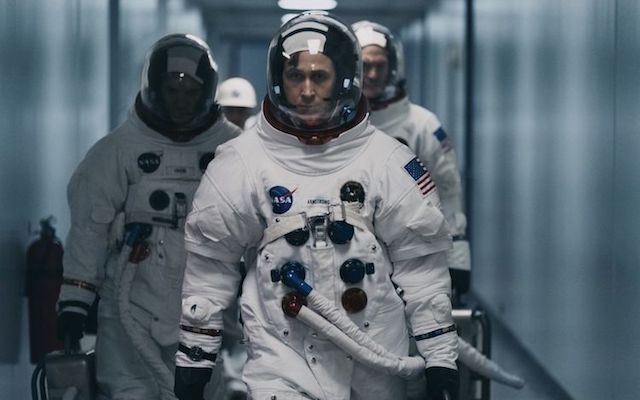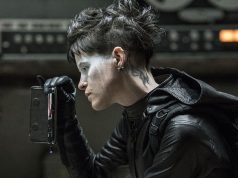
Ryan Gosling is a handsome man, but it’s his profile that’s most aesthetically pleasing. We saw a lot of it in “Drive,” where he sat behind the wheel of a car and was was often photographed from the passenger seat, and we see it again in “First Man,” where he’s a test pilot in a cockpit. The pilot, like the driver, is a man of few words who keeps his emotions under wraps. But unlike the driver, the pilot has a name: NEIL ARMSTRONG.
Yes, that one. “First Man,” which reunites Gosling with “La La Land” director Damien Chazelle, is a biography of Armstrong covering the decade-long journey that ended with him on the moon (well, that ended with him coming back from the moon). Adapted by Josh Singer (“The Post,” “Spotlight”) from James R. Hansen’s book, the film handles the biopic tropes with better-than-average success, shedding light on a man who had a household name but whose private nature made him an enigma to the public. It runs long, with restlessness setting in during the midsection, but Chazelle handles the climax — the moon landing itself — with breathless, meticulous cinematic skill.
Neil is an aeronautics engineer (an “egghead” in one observer’s estimation) and a fearless test pilot when, in 1962, he’s chosen for NASA’s Project Gemini, a steppingstone toward the Apollo missions that will lead us to the moon. It’s the height of the Cold War and the “space race,” and the Soviets have been beating America to all the benchmarks. It’s imperative, therefore, that we get to the moon before they do, because if they get there first, well, then, that would be bad, because…. (The movie does not finish the sentence.)
Neil and his wife, Janet (Claire Foy), and their little boy move to Houston, having already lost a daughter to cancer (they would have another son in Texas). Neil’s new co-worker, Ed White (Jason Clarke), lives across the street with his wife, Pat (Olivia Hamilton). The wives bond over the stress of being married to astronauts; Neil and Ed enjoy working together and would describe themselves as friends, but Neil never talks to Ed — or anyone — about his feelings. He’s particularly tightlipped about the death of his daughter, which affected him deeply.
The years pass quickly in movie terms as Chazelle hits the highlights of the Gemini missions and Armstrong’s role in them. (Side note: “Gemini” is consistently pronounced “gemin-ee,” not “gemin-eye.” The ’60s were a crazy time, man.) Neil emerges as a thoughtful scientist with steel nerves, saving his own life or the lives of others on more than one exciting occasion. But there are tragedies he cannot prevent, as space-exploration buffs no doubt recall. As time passes and the casualties mount, and as America is mired ever deeper in Vietnam and other unrest, people start to ask: Is going to the moon worth all the money and lives it’s costing?
The answer can only be yes, right? Chazelle doesn’t really make a strong case for it (other than presenting the culmination of the mission with reverent awe), but if it was all a boondoggle, then this story is depressing and ironic, not inspiring. But it seems a misstep to raise the “Is it worth it?” question and then act like it was rhetorical.
Like most of the missions it depicts, the film is top-notch in technical aspects, Linus Sandgren’s cinematography and Justin Hurwitz’s sweeping musical score leading the way. Also like the missions, the movie drags in the middle as a sense of repetition creeps in. (I know, I know: The process WAS repetitive.) You wouldn’t initially think of it as an effects-heavy film — it’s science-fact, not science-fiction — but the sequences set in space and on the moon are uncannily convincing, even better than the ones Stanley Kubrick faked 49 years ago (kidding). The supporting cast is full of familiar faces: Kyle Chandler, Pablo Schreiber, Christopher Abbott, Ciaran Hinds, Patrick Fugit, Lukas Haas, Shea Whigham, Ethan Embry, and Corey Stull. The latter plays Buzz Aldrin, who was a bit of a jerk, or at least comes off that way when the movie is about Neil Armstrong.
Biopics about people who were stoic and inscrutable are risky, as there often isn’t enough available information about them — because they were stoic and inscrutable, you see — to flesh out a movie protagonist. “First Man” and Gosling’s performance avoid that problem by giving Neil an arc that, accurate or not, provides satisfying resolution to his character. Scenes of people around the world celebrating what America has achieved on behalf of all mankind (minus the Soviets — this was to spite them, not help them) are a reminder that for all our manmade divisions and quarrels, we are one world that reached out and touched another one. And that’s pretty awesome.
B (2 hrs., 18 min.; )





